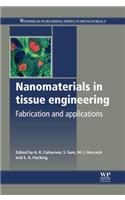
Nanomaterials in Tissue Engineering: Fabrication and Applications
Series: Woodhead Publishing Biomaterials
Nanomaterial technologies can be used to fabricate high-performance biomaterials with tailored physical, chemical, and biological properties. They are therefore an area of interest for emerging biomedical technologies such as scaffolding, tissue regeneration, and controlled drug delivery. Nanomaterials in tissue engineering explores the fabrication of a variety of nanomaterials and the use of thes
NaN
VOLUME
English
Hardback

Nanomaterial technologies can be used to fabricate high-performance biomaterials with tailored physical, chemical, and biological properties. They are therefore an area of interest for emerging biomedical technologies such as scaffolding, tissue regeneration, and controlled drug delivery. Nanomaterials in tissue engineering explores the fabrication of a variety of nanomaterials and the use of these materials across a range of tissue engineering applications. Part one focuses on the fabrication of nanomaterials for tissue engineering applications and includes chapters on engineering nanoporous biomaterials, layer-by-layer self-assembly techniques for nanostructured devices, and the synthesis of carbon based nanomaterials. Part two goes on to highlight the application of nanomaterials in soft tissue engineering and includes chapters on cardiac, neural, and cartilage tissue engineering. Finally, the use of nanomaterials in hard tissue engineering applications, including bone, dental and craniofacial tissue engineering is discussed in part three. Nanomaterials in tissue engineering is a standard reference for researchers and tissue engineers with an interest in nanomaterials, laboratories investigating biomaterials, and academics interested in materials science, chemical engineering, biomedical engineering and biological sciences.About the Author: Akhilesh Gaharwar works at the David H. Koch Institute for Integrative Cancer Research at Massachusetts Institute of Technology (MIT) and Research Fellow in the Wyss Institute for Biologically Inspired Materials at Harvard University, Massachusetts. His research experience spans diverse fields including materials science, chemistry, biology, and microfabrication of polymeric biomaterials and nanocomposites. His current research focus is developing technologies to control the formation of vascularized orthopedic tissues with appropriate microarchitectures as well as regulating stem cell differentiation within microengineered systems. Shilpa Sant is Assistant Professor of Pharmaceutical Studies at the University of Pittsburgh, Pennsylvania. She has extensive research experience in diverse fields including materials science, polymer chemistry, drug delivery, tissue engineering, natural and synthetic biomaterials and microfabrication. Matthew Hancock is Research Scientist at the Broad Institute, MIT, leading projects to develop devices for circulating tumor cell (CTC) and sepsis detection and anti-cancer drug screening. S. Adam Hacking is Director of the Laboratory for Musculoskeletal Research and Innovation (LMRI) at Massachusetts General Hospital. His work is focused on novel methods to fight implant infection, methods to enhance implant fixation, the use of non-invasive techniques to assess skeletal integrity and implant fixation, methods to improve defect healing, fracture healing and allograft incorporation and the use of micro-fabrication techniques to generate bone from its fundamental unit, the osteon.
Price Comparison [India]
In This Series
Bestseller Manga
Trending NEWS




















